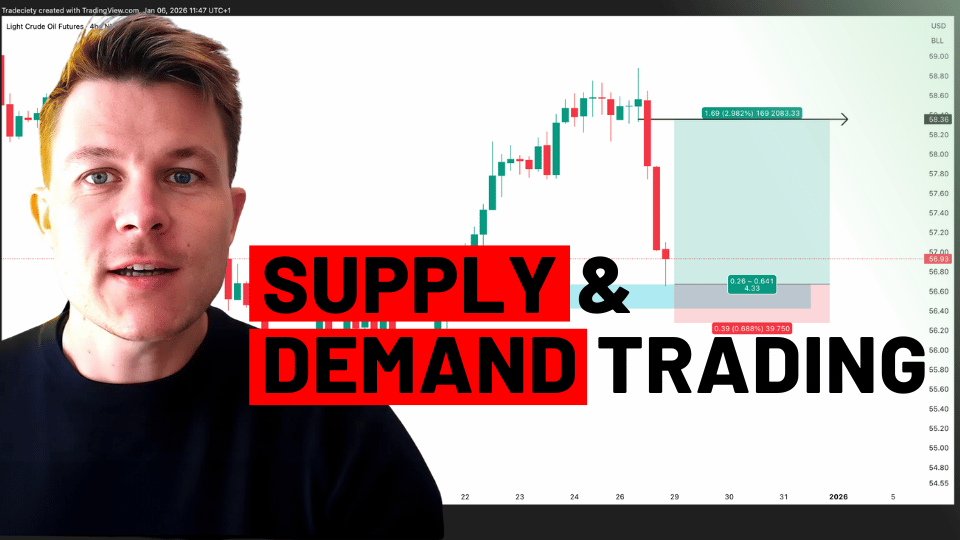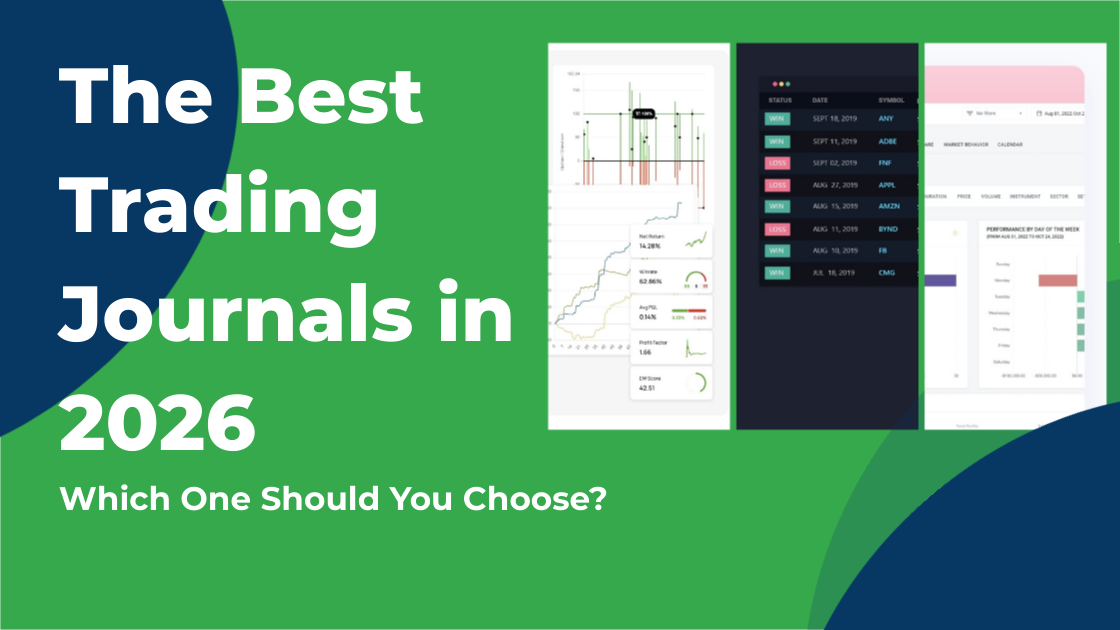Supply and Demand Trading in 2026
We have been trading supply and demand strategies for over ten years, and they have stood the test of time remarkably well. Supply and demand is...
Trading is more than just taking entries and exits; making money, protecting your trading capital, and dealing with the psychological aspects of money are often overlooked aspects of successful trading, keeping traders from reaching their full potential. As a trader, you need to develop healthy money habits that support your goals and help you stay clear of the common pitfalls that many amateurs fall into. It doesn't matter if you're a veteran trader or a newcomer to trading — solid money habits can transform your trading approach from a gambling attitude, relying on luck, to a methodical style putting the odds in your favor for the long term.
Each good habit you form is like a gear in a finely tuned engine, helping you keep a cool head when emotions are about to take over and ensuring you follow your strategies with precision, not hot-headed impulsiveness. This article will explain the top ten money habits that successful traders live by.
In retail trading, conservative capital allocation plays an important role. Traders should only commit a small fraction of their overall net worth to their brokerage accounts – this is especially true in the beginning. This approach is not only about financial preservation, but it also serves as a psychological defense. By making sure that the stakes involved do not threaten one's standard of living, traders can remain emotionally neutral. Losses, which are inevitable, become less catastrophic and more manageable and help traders avoid emotion-driven decisions that usually cause even more harm.
This strategy also protects the trader's mental capital—a resource as critical as financial capital—by minimizing the emotional pressure related to fluctuations in the account balance.
The 1% rule per trade stands as a cornerstone of risk management, forcing traders to not risk more than 1% of their total trading capital per trade. Adhering to this rule is not only about limiting financial losses but it's fundamentally about achieving stability and consistency. Such a constraint on potential losses avoids the dramatic dips and spikes in account value that can scare even the most stoic of traders.
Keeping losses small and consistent provides two advantages: firstly, it preserves financial capital, allowing traders to remain in the game for the long haul, and secondly, it maintains a buffer against the emotional rollercoaster that large losses can cause. Emotional pressure can lead to numerous trading problems, including overtrading, trading with fear, or abandoning a trading strategy altogether.
When traders stay committed to the 1% rule, they can ensure that their emotions remain in check, which is as crucial to long-term success as any trading strategy or market analysis.
A stop loss serves as an essential component of risk management strategies, acting as a predetermined exit point for a losing trade. When a trade goes against you, the stop-loss is triggered, limiting the loss, and preventing a minor setback from spiraling into a loss that traders cannot recover from.
By setting a fixed stop loss order, traders define their risk threshold on each trade. This then allows them to walk away from their trading platform; they do not have to “babysit” their trades and constantly monitor open positions. This detachment not only conserves mental energy but also supports a disciplined approach to trading, ensuring decisions are not made in the heat of the moment when emotions are influencing your trading decisions.
A stop-loss order is similar to a life jacket—it won't prevent the storm, but it will keep you afloat when the waves hit, allowing you to sail another day.
 It's also very important for traders to have a clear-cut point where they say, "Okay, that's enough for now." It's kind of like setting up a personal rulebook that signals when it's time to take a breather from trading, whether that's just for the rest of the day or maybe a bit longer. For instance, a trader might decide to step back after realizing two consecutive losses. This rule acts as a circuit breaker to prevent the emotional trading issues that can follow losses, which might otherwise lead to impulsive decisions and further avoidable losses.
It's also very important for traders to have a clear-cut point where they say, "Okay, that's enough for now." It's kind of like setting up a personal rulebook that signals when it's time to take a breather from trading, whether that's just for the rest of the day or maybe a bit longer. For instance, a trader might decide to step back after realizing two consecutive losses. This rule acts as a circuit breaker to prevent the emotional trading issues that can follow losses, which might otherwise lead to impulsive decisions and further avoidable losses.
Another stop rule could be setting a threshold for capital loss, such as deciding to stop trading after a 4% loss in one's trading capital. This limit serves as a safety net, ensuring that traders do not fall into the dangerous trap of "chasing losses" where the attempt to recover lost capital leads to increased and often reckless risk-taking.
Professional traders document and analyze their past trading activity in a trading journal. Their trading journal is invaluable for identifying areas for improvement and recognizing weaknesses in one's trading strategy. Some of the most important metrics to consistently track include the average size of winning versus losing trades, the win rate, and the overall effectiveness of the trading process, which means the frequency and nature of mistakes made.
A trading journal and record-keeping serve multiple purposes. First, it provides a data-driven foundation for evaluating the trader's approach, allowing them to make informed adjustments rather than relying on intuition or anecdotal evidence. Second, by keeping track of performance statistics, traders can maintain a clear and objective view of their trading efficiency, which is crucial for making strategic decisions.
A well-maintained trading journal detailing all relevant metrics becomes a strategic tool, enabling traders to systematically review their actions and outcomes. It allows them to dissect their trading methods and behaviors, isolate what is working well, and shed light on areas where they may be underperforming. This level of introspection and analysis is essential for continuous growth and maintaining a competitive edge in the market.
If you're getting serious about trading, one golden rule you can't ignore is to keep your trading money separate from your personal funds. This means deciding on a pot of money that's just for trading - this is your risk capital. That way, you know exactly what you can afford to trade with without messing with the money you need for everyday bills and your nest egg.
Think of it like this: when you split your funds, you're treating your trading like a business. It's not just a side hustle or something that bleeds into your personal spending. It's its own thing, with its own budget and game plan.
Doing this also stops you from misusing your rainy-day fund when the market gets tough. You can ride out the ups and downs without putting your financial security on the line. Bills like your mortgage, school fees, or that retirement trip you're dreaming of won't be at risk because of a bad day on the market.
Maintaining emotional control is important to successful trading and healthy money habits. This discipline is what separates a methodical trader from a gambler. A trader skilled in emotional regulation can navigate unpredictable financial markets with a level of self-confidence and planning. The characteristic of such a professional trader is a commitment to a trading strategy, and resisting impulsive fear and greed responses, which are the pitfalls that prevent long-term profitability.
Giving in to emotional urges can lead to quick impulses that represent gambling rather than informed trading. Therefore, exercising emotional discipline is important to ensure that trading decisions are based on established trading rules and thorough market analysis, rather than being influenced by the excitement of potential profits or the disappointment of losses.
Implementing regular self-evaluations, embracing mindfulness, and relying on a robust support system are key practices in building emotional strength. The aim is to develop resilience and a professional mindset that values consistent processes over sporadic results.

Patience is one of the most important traits for a successful trader with healthy money habits. Success in trading is often a slow and deliberate process, more like a marathon than a sprint.
Employing sound risk management principles and avoiding the temptation to over-leverage is essential for long-term success. Building a trading account is a long endeavor, achieved by the consistent application of disciplined tactics and the patience to wait for trading opportunities that align with one's trading strategy. Patience reduces the urge to act on every market ripple.
Impatience can be costly. It may lead traders to make rash decisions, undermining the very foundation of their trading strategy. The impatient trader often finds themselves caught in a cycle of over-trading and under-preparing, a cycle that never leads to sustainable growth.
"Compound interest is the eighth wonder of the world. He who understands it, earns it; he who doesn't, pays it." - Einstein
In contrast, the patient accumulation of profits, compounded over time, can lead to remarkable results. This methodical approach demands resilience and adherence to a long-term perspective, where each decision is a building block to build one's trading capital. The professional trader knows that it is not the speed of capital growth but its sustainability that truly counts.
It is crucial for traders to remember that their value is not determined by the outcomes of their trades. When traders intertwine their self-worth with their trading performance, they risk becoming overly invested emotionally, which can obscure the broader view necessary for sound decision-making. A well-rounded life, rich in diverse interests and activities, provides a healthy counterbalance to the inevitable ups and downs of trading.
By creating a life that's full outside of trading, individuals can appreciate their trading activities as just one facet of their identity. This perspective allows them to approach trading with a level-headedness that is less likely to be influenced by any single trading success or setback. Such a balanced approach can prevent the emotional rollercoaster that often accompanies volatile trading results and helps ensure that one's trading outcomes do not influence overall mood or spill into other aspects of life.
In essence, maintaining balance is about recognizing that trading is a part of life, not the entirety of it.
It is essential for traders to establish an emergency fund, a financial buffer consisting of several months' worth of living expenses set aside. Having this reserve significantly contributes to mental clarity and peacefulness. Traders who must generate a consistent income from their trades week after week will feel pressured to trade (well) which can negatively influence their ability to make rational trading decisions.
The reality of trading is that it does not offer the same predictability as a regular paycheck. The number of viable trading opportunities can vary widely from one week to the next, with no guarantees on the income that trading will produce in a given time frame. An emergency fund thus serves as a stress-relieving cushion, ensuring traders are not operating under the financial pressure of needing to win every trade to meet their immediate financial obligations.
By separating their immediate livelihood from the performance of their trading, individuals create a degree of financial insulation. This separation reduces the need to engage in trades out of necessity rather than strategic choice, allowing for more thoughtful and less pressured decision-making.

We have been trading supply and demand strategies for over ten years, and they have stood the test of time remarkably well. Supply and demand is...

3 min read
Choosing the right trading journal is essential for traders wanting to analyze performance, refine strategies, and improve consistency. In this...

3 min read
“95% of all traders fail” is the most commonly used trading related statistic around the internet. But no research paper exists that proves this...
